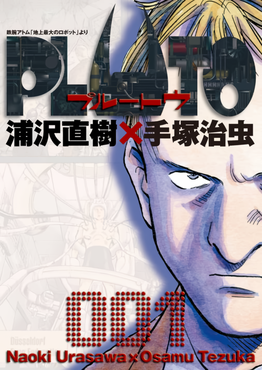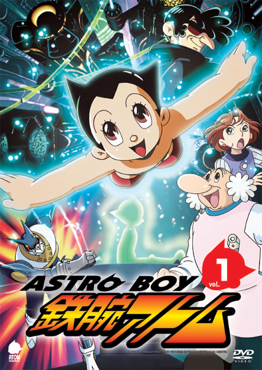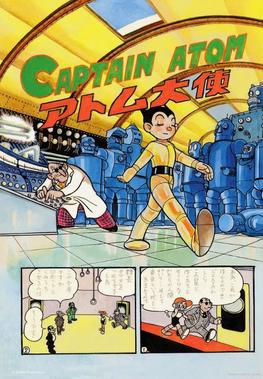
Astro Boy, known in Japan as Mighty Atom, is a Japanese manga series written and illustrated by Osamu Tezuka. It was serialized in Kobunsha's Shōnen from 1952 to 1968. The 112 chapters were collected into 23 tankōbon volumes by Akita Shoten. Dark Horse Comics published an English translation in 2002. The story follows Astro Boy, an android young boy with human emotions who is created by Umataro Tenma after the recent death of his son Tobio. Eventually, Astro is sold to a robot circus run by Hamegg, but is saved from his servitude by Professor Ochanomizu. Astro becomes a surrogate son to Ochanomizu who creates a robotic family for Astro and helps him to live a normal life like an average human boy, while accompanying him on his adventures.

Black Jack is a Japanese manga series written and illustrated by Osamu Tezuka in the 1970s, dealing with the medical adventures of the title character, doctor Black Jack. Black Jack consists of hundreds of short, self-contained stories that are typically about 20 pages long. Black Jack has also been animated into an OVA, two television series and two films.

Osamu Tezuka was a Japanese manga artist, cartoonist and animator. Born in Osaka Prefecture, his prolific output, pioneering techniques and innovative redefinitions of genres earned him such titles as "the Father of Manga", "the Godfather of Manga" and "the God of Manga". Additionally, he is often considered the Japanese equivalent to Walt Disney, who served as a major inspiration during Tezuka's formative years. Though this phrase praises the quality of his early manga works for children and animations, it also blurs the significant influence of his later, more literary, gekiga works.
Frederik L. Schodt is an American translator, interpreter, and writer.
Osamu Tezuka's Star System is the name given to the recurring characters in manga created by manga artist Osamu Tezuka. Throughout his career, Tezuka frequently re-used the same character designs or names in different roles across his series; for example, the character Shunsaku Ban appears as a detective in Metropolis and as Astro Boy's teacher in Astro Boy. The name alludes to the Hollywood practice of the star system, and can be seen as analogous to film directors who work with the same actors across multiple movies; Tezuka joked about how much his characters were paid, and occasionally based them on famous western actors.

Pluto: Urasawa × Tezuka is a Japanese manga series written and illustrated by Naoki Urasawa. It was serialized in Shogakukan's seinen manga magazine Big Comic Original from September 2003 to April 2009, with its chapters collected into eight tankōbon volumes. The series is based on Osamu Tezuka's Astro Boy, specifically "The Greatest Robot on Earth" story arc, and named after the arc's chief villain. Urasawa reinterprets the story as a suspenseful murder mystery starring Gesicht, a Europol robot detective trying to solve the case of a string of robot and human deaths. Takashi Nagasaki is credited as the series' co-author. Macoto Tezka, Tezuka's son, supervised the series, and Tezuka Productions is listed as having given cooperation.

Astro Boy: Omega Factor is a beat 'em up video game developed by Treasure and Hitmaker, and published by Sega. The game was released for the Game Boy Advance on December 18, 2003 in Japan; August 17, 2004 in North America; and February 18, 2005 in Europe. The game is based on Osamu Tezuka's manga and anime franchise Astro Boy. However, it also features characters and plotlines from the artist's entire canon of work.

Astro Boy, known in Japan and Pluto as Atom, is a superhero and the protagonist of the eponymous franchise. Created by Osamu Tezuka, the character was introduced in the 1951 Captain Atom manga. Astro Boy has appeared in animated television shows and in the animated feature film adaptations of its eponymous manga, as well as a live-action TV series, other works by Tezuka, and video games.

Astro Boy, sometimes referred to as New Mighty Atom, is a color remake of the 1960s anime black-and-white series of the same name, both series are adapted from the manga series by Osamu Tezuka.

Astro Boy is a Japanese anime television series, based on Osamu Tezuka's manga series of the same name. Produced by Tezuka Productions, Sony Pictures Entertainment Japan, Animax, Dentsu, and Fuji TV, it was directed by Kazuya Konaka, with Marc Handler as the story editor, Shinji Seya designing the characters, Shinji Aramaki and Takeshi Takakura designing the mechanical elements, Keiichirō Mochizuki serving as chief animation director, and Takashi Yoshimatsu composing the music.

Astro Boy is a Japanese television series that premiered on Fuji TV on New Year's Day, 1963, and is the first popular animated Japanese television series that embodied the aesthetic that later became familiar worldwide as anime. It originated as a manga of the same name in 1952 by Osamu Tezuka, revered in Japan as the "God of Manga". It lasted for four seasons, with a total of 193 episodes, the final episode presented on a Saturday, New Year's Eve 1966.
Doctor Thrill is a manga series written and illustrated by Osamu Tezuka, published in Shogakukan's Weekly Shōnen Sunday from April 5, 1959, to September 6 of the same year.
Tezuka Productions Co., Ltd. is a Japanese animation studio founded by Osamu Tezuka in 1968. It is known for animating notable works such as Marvelous Melmo, the 1980 and 2003 Astro Boy series, and Black Jack. It is also the holder of the intellectual property of Tezuka's works; his son, Makoto Tezuka, currently aims to use the company to extend Tezuka's manga series with new issues and publish posthumous works such as Legend of the Forest.

Shōnen Book was a manga magazine by Shueisha, which debuted March 1958 and ended in April 1969. Shōnen Book was originally a spin-off of Shueisha's Omoshiro Book. Shōnen Book is famously known in Japan for being the predecessor to the company's famous Weekly Shōnen Jump magazine. The Shōnen Book tankōbon manga volumes are published under the Shōnen Speed Ō (少年スピード王) manga imprint. Shōnen Book was a part of Shueisha's former leading magazine line, Book, now Jump. Shōnen Book was created in 1958 as a male version of the short lived Shōjo Book. Omoshiro Book became an offshoot of the magazine, and eventually faded away in the middle of the Shōnen Book timeline. Shōnen Book also served as a root to many other magazines published by Shueisha.
Mighty Atom is a Japanese black-and-white Tokusatsu live-action TV drama that aired on MBS from March 7, 1959 to May 28, 1960 for a total of 65 episodes split into five parts

Jetter Mars is an anime series directed by Rintaro and written by Osamu Tezuka.

Atom: The Beginning is a Japanese manga series written and illustrated by Tetsurō Kasahara, with writing contributions by Makoto Tezuka and Masami Yuki. It was serialized in Hero's Inc.'s Monthly Hero's magazine from December 2014 to December 2020 and transferred to Comiplex online website in November 2020. Its chapters have been collected in 21 tankōbon volumes as of September 2024. An anime television series adaptation aired from April to July 2017.

Ambassador Atom is a manga short series written by Osamu Tezuka. It was originally serialized in Kobunsha's Shōnen magazine from 1951 to 1952. The series is mostly noted for introducing the world-famous character Astro Boy. The series would be released as Chapter 0 in the original Astro Boy tankōbon volumes published by Kodansha.
Mari Shimizu is a Japanese voice actress affiliated with 81 Produce. She is known for voicing the titular protagonist of the 1963 Astro Boy television series and its 1980 colour remake, Belo in Humanoid Monster Bem, and the titular protagonist of Jetter Mars.












